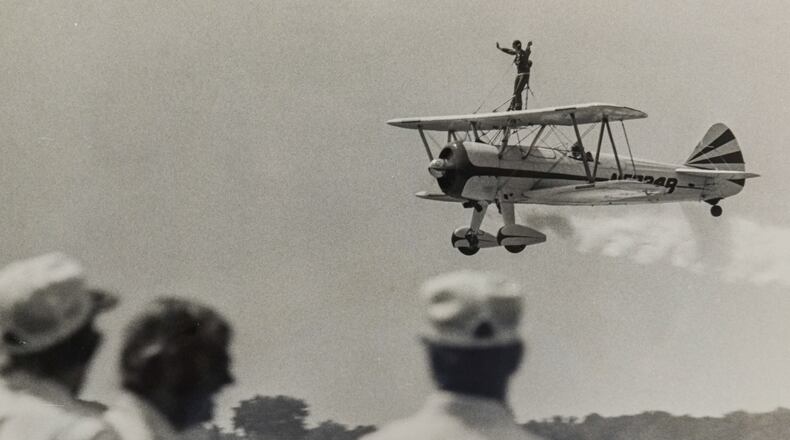Do you feel that you were you treated differently as a woman, and do you think attitudes have changed since then?
Oh, attitudes definitely have changed. I think, looking back, like my first lesson, there were benches outside and everybody just kind of hangs out and talks. Some of them said ‘What’s she doing?’ ‘Well, she’s gonna learn to fly.’ ‘Are you kidding me? She won’t last.’ But I guess I could ignore that. Then I would help out down there, too. One of the instructors made an offer that if I washed the parts and things like that, I could get free ground school. It was a small place, and we were like family. We would have cookouts on the weekends, and we had a clubhouse. You didn’t have to be a pilot if you were just interested in aviation. So it was people of all different ages, retired people, even some young people, but you were always welcome. It was just like a larger family and I wasn’t used to that. They would look out for me. I was really very lucky.
How did you and your husband get started in the business?
When the opportunity came up to buy an airplane, we had flown for a few owners before we went into the business full time. We didn’t owe anybody anything, and we didn’t have any kids — we never did have kids — and we didn’t want to go down 10 years later and say, ‘Oh, I wish we’d done that.’ So we thought, if it doesn’t work out, it doesn’t work out, but we’ll just start fresh and see how it goes. So we sold everything we had and packed it all into the plane. And it was kind of scary, but everything worked out. When we started, I like to call it the Golden Age of Aviation and flying cross country. There were so many little airports, little sod fields, family-run after World War II. A lot of the guys came home from the service and bought farms and little airplanes. There was just a passion for it. We had paper charts, we had a radio. There was no GPS, right? There were no cell phones, right? So when we left, sometimes, if the weather is bad, and we went to try to get fuel or something, if the airport was closed, they would have a phone number you could call at the phone booth to get assistance. You had to be sure to bring coins with you. I mean, just all the little things that were different from what they are today.
What was the first Dayton Airshow weekend like?
I never dreamed that it was going to grow into something so large. And it was a hometown air show for us. When you’re coming to a performer’s hometown show, like the Thunderbirds or the Blue Angels, it’s special for them. It’s just so special to be able to perform in front of the people we grew up with. The first one, you didn’t know if they were going to have another, so you didn’t think about, ‘Oh my gosh, I’m at the first one.’ It was more like, ‘This is really nice. I wonder if they will do it next year?’ And then when they moved north, then you could just see it grow year by year. It was amazing. They went on to have a trade show that would start midweek. We would have seminars in the early days to get more activity. They would invite the local, experimental aircraft, the EAA chapters, different kinds of little airplanes on display. I don’t even know how many acres they use now.
You were inducted into the Women In Aviation (WIA) Pioneer Hall of Fame in 2017. What was that like?
It was an honor. I was involved with WIA before it was even an organization. I was friends with the founder when she and her first husband moved to town and they didn’t know anybody. She needed volunteers. So I said sure, I can help. And I gathered another one of my girlfriends and we were involved with sending out brochures. But going to WIA in 2017, being on the stage and not knowing what they were going to present, and then they flashed a picture of my dad. So I was choked up a little bit.
What would you say to the next generation of women looking to become a pilot or even an air show performer?
That now there are no boundaries. They can do anything they want. And I don’t know if you realize how many women are out there, and when they all come to the convention, and you see all the military pilots, and they have on their dress whites, commercial pilots. Now you don’t think twice about seeing a woman up in the front of the plane. It is wide open now, and there are so many jobs — they’re looking for pilots. I get so excited when I can get somebody interested in flying.
Is there anything else you’d like to say about your career?
We’ve been retired now something like 20 years. Looking back, things on the plane would break sometimes, and you would need help or transportation to here or there. So it’s important that we acknowledge the friends who have helped us along the way.
About the Author


